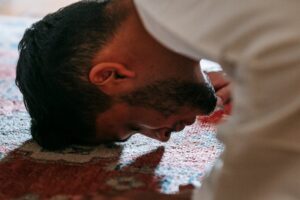Anas (RAA) narrated that the messenger of Allah (SAAW) said: “Three scrolls will be spread for each servant at the Day of Judgment; A scroll of good deeds, a scroll of bad deeds and a scroll of God’s provisions and blessings. Allah (SW) will call on one of the smallest blessings from the scroll of provisions to cash its worth from the good deeds, and this one blessing will end up wiping out all good deeds! This blessing will still say: ‘My Lord, it is not sufficient yet.’ And when there are only two scrolls left, one of sins and one of provisions, and if Allah (SW) chooses to bestow mercy on His servant, Allah will say: ‘My servant, I shall expand your good deeds, forgive your bad, and gift you my provisions for free.’”[1]
This story clearly defines our need for the mercy of God. Our deeds will never be such as to be equivalent to one of His (SW) blessings, and without His mercy we have no chance for our sins to be forgiven or our good deeds to be rewarded.
The prophet (SAAW) related a story about a monk from the Children of Bani Isra’eel who worshiped God for 600 years and thought he earned his right to enter Heaven by his own effort! God weighed his deeds on one side of the scale and weighed only the blessing of eyesight on the other side of the scale. His 600 years of deeds were too light to weigh against one such blessing.
The prophet (SAAW) made this message clear when he said: “No one enters Heaven because of his deeds.” Sahabah asked: “Even you, O messenger of Allah?” He (SAAW) replied: “Even I, unless Allah bestows His mercy on me.”[2]
Our existence, our deeds, our blessings, and everything we are indulging in now in this life is all a gift from God. Allah (SW) said: {And there is no blessing you enjoy which isn’t a gift from your Lord.} And for that we should understand that the outcome of our deeds is not to be measured by our right to claim it, but rather by our ability to recognize the truth that it is all from Allah. (SW)
One might ask, why do so many verses in the Quran use the language referring to the effort put forth by the servant to enter Heaven? The answer is in two points, First is to recognize the choices made by the servant since he or she was given the ability to choose the opposite. And secondly, it is only a promise from God alone to allow someone entrance into Heaven, not a contract based on the worth of the deeds provided.
However, from the perspective of bad deeds, things are different. The prophet (SAAW) said: “Scrolls are of three kinds at the Day of Judgment; a scroll that is not of a great value, a scroll that God will not let pass, and a scroll that God will not forgive. The scroll that God will not forgive is Shirk, which is idolatry, polytheism, or associating partners with Him. And the scroll that is of no great value is one that contains transgressions between the servant and His Lord, like missing a prayer or a day of fasting. And the scroll that God will not let pass and will put to account is one that holds transgressions of people towards each other; it shall be held to liability.”[3]
The reality of the scrolls on the Day of Judgment is an account each one will be held responsible for. Let us try to continuously remind ourselves of the clear messages we were given before it’s too late. We pray and ask Allah (SW) to grant us His mercy, forgive our sins and elevate us in levels of Heaven, Ameen.
By Sh Kifah Mustapha
[1] Narrated by Al-Bazzar
[2] Narrated by Bukhari
[3] Narrated by Imam Ahmad




